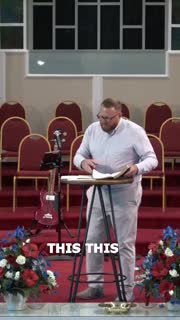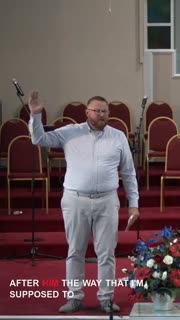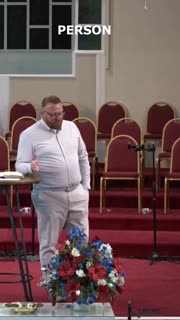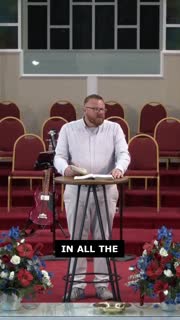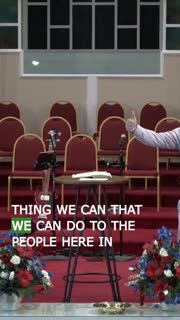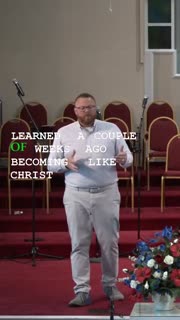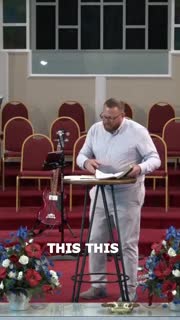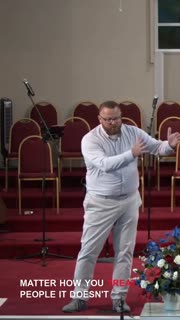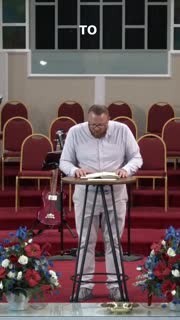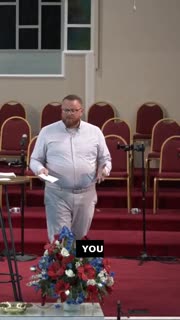Transformative Power of Love: Loving God and Others
Devotional
Sermon Summary
Bible Study Guide
Sermon Clips
### Quotes for Outreach
1. "A disciple loves God and loves people. That is our goal. That is what we should be pursuing. Last week we talked about loving God passionately, completely, and pursuing Him in our lives. This leads us to this second command that Jesus gives us, which is to love our neighbors as ourselves." [41:15] (60 seconds)
2. "You cannot love people the way that God wants you to love them on your own. On your own, you can't love your spouse, your children, your enemy, your best friend, or your fellow church member the way that God wants you to love them. But when you love God correctly, He puts His love in you, making it possible for you to love people the way He desires." [01:06:21] (60 seconds)
3. "The most unloving thing that you can do to an unsaved person is to keep the gospel from them. The most loving thing that you can do to someone that's unsaved is to share the gospel, tell them about Jesus, and point them to the Savior." [01:12:39] (19 seconds)
4. "In all the chaos and all the noise that is going on today, if the unsaved world does not at least know that we love them, then we're doing this the wrong way. If they don't know that we at least love them, then we're doing it the wrong way." [01:12:39] (34 seconds)
5. "The most loving thing that we can do to the people here in Granite Falls is point them to Jesus. The most loving thing that we can do here in America is point our nation back to Christ. The most loving thing that we can do around the world is to point them to Jesus." [01:14:09] (15 seconds)
### Quotes for Members
1. "Discipleship is that process in our lives, as we learned a couple of weeks ago, of becoming like Christ. That is our goal now after salvation, to become like Christ in every area of our lives. This is an ongoing process every day of our lives until we see Jesus face to face." [37:44] (21 seconds)
2. "In this passage of scripture, we see the call for a disciple to love God and to love people. And listen, you cannot get those two things flipped around. You've got to make sure that you're loving God first. Out of a love for God, out of a passion for God, out of a relationship with God, He puts in you a love for people." [41:15] (60 seconds)
3. "There are people in my life that I need to work on loving. There are people in my life that the relationship between me and them sometimes is like fingernails on a chalkboard. It's hard to get along sometimes. But as Christians, we ought to work on loving these people." [51:26] (60 seconds)
4. "In our lives, there are going to be people that we don't want to love. Maybe it's because of something that they've said or something that we've said to them or they've said to us. Maybe it's a way that they've treated us. But here in this passage, Jesus is telling us that it is our responsibility as His followers to love people." [01:04:34] (60 seconds)
5. "If you have a problem loving someone, you start with your own relationship with God. You go there first. Am I loving Him the way that I ought to love Him? This is how we can love people. This is why we should love people. There's not a single person on the face of this earth that we shouldn't love." [01:06:21] (23 seconds)
Ask a question about this sermon
1. "A disciple loves God and loves people. That is our goal. That is what we should be pursuing. Last week we talked about loving God passionately, completely, and pursuing Him in our lives. This leads us to this second command that Jesus gives us, which is to love our neighbors as ourselves." [41:15] (60 seconds)
2. "You cannot love people the way that God wants you to love them on your own. On your own, you can't love your spouse, your children, your enemy, your best friend, or your fellow church member the way that God wants you to love them. But when you love God correctly, He puts His love in you, making it possible for you to love people the way He desires." [01:06:21] (60 seconds)
3. "The most unloving thing that you can do to an unsaved person is to keep the gospel from them. The most loving thing that you can do to someone that's unsaved is to share the gospel, tell them about Jesus, and point them to the Savior." [01:12:39] (19 seconds)
4. "In all the chaos and all the noise that is going on today, if the unsaved world does not at least know that we love them, then we're doing this the wrong way. If they don't know that we at least love them, then we're doing it the wrong way." [01:12:39] (34 seconds)
5. "The most loving thing that we can do to the people here in Granite Falls is point them to Jesus. The most loving thing that we can do here in America is point our nation back to Christ. The most loving thing that we can do around the world is to point them to Jesus." [01:14:09] (15 seconds)
### Quotes for Members
1. "Discipleship is that process in our lives, as we learned a couple of weeks ago, of becoming like Christ. That is our goal now after salvation, to become like Christ in every area of our lives. This is an ongoing process every day of our lives until we see Jesus face to face." [37:44] (21 seconds)
2. "In this passage of scripture, we see the call for a disciple to love God and to love people. And listen, you cannot get those two things flipped around. You've got to make sure that you're loving God first. Out of a love for God, out of a passion for God, out of a relationship with God, He puts in you a love for people." [41:15] (60 seconds)
3. "There are people in my life that I need to work on loving. There are people in my life that the relationship between me and them sometimes is like fingernails on a chalkboard. It's hard to get along sometimes. But as Christians, we ought to work on loving these people." [51:26] (60 seconds)
4. "In our lives, there are going to be people that we don't want to love. Maybe it's because of something that they've said or something that we've said to them or they've said to us. Maybe it's a way that they've treated us. But here in this passage, Jesus is telling us that it is our responsibility as His followers to love people." [01:04:34] (60 seconds)
5. "If you have a problem loving someone, you start with your own relationship with God. You go there first. Am I loving Him the way that I ought to love Him? This is how we can love people. This is why we should love people. There's not a single person on the face of this earth that we shouldn't love." [01:06:21] (23 seconds)
